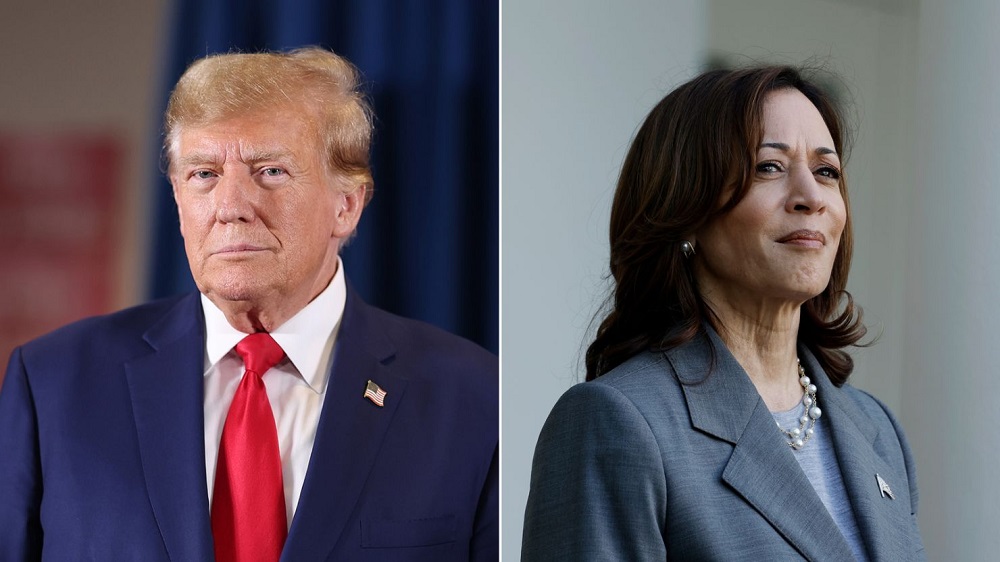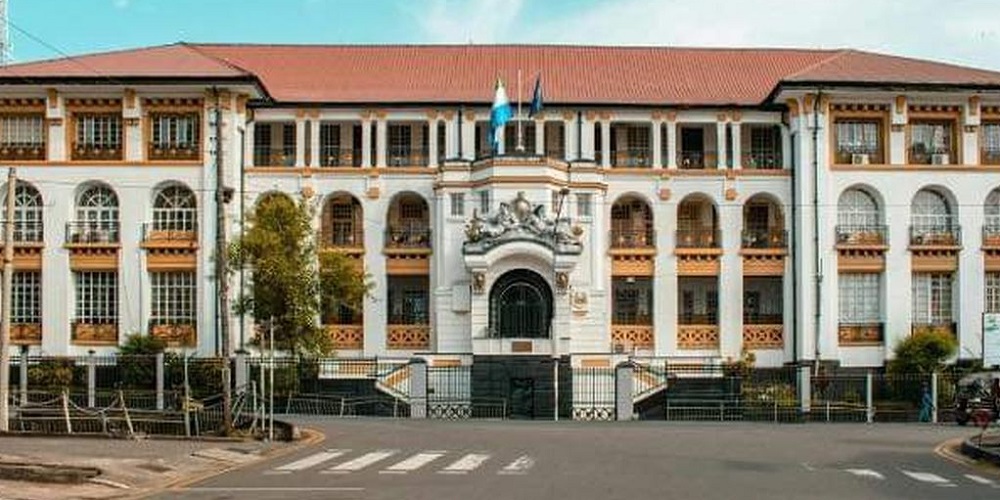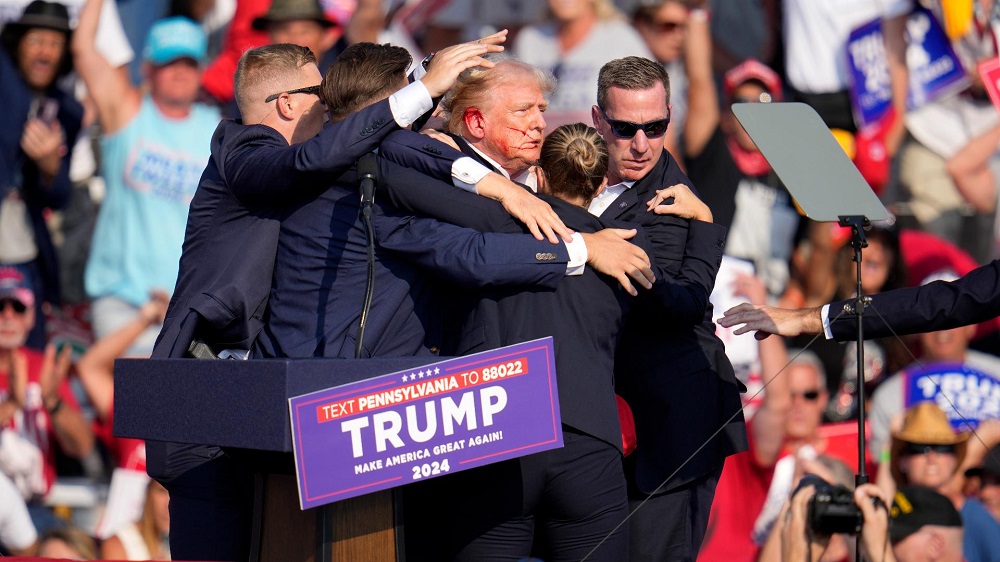Foreign
JUST IN: US Supreme Court restores Trump to ballot

…reject state attempts to ban him over Capitol attack
The Supreme Court on Monday unanimously restored Donald Trump to 2024 presidential primary ballots, rejecting state attempts to ban the Republican former president over the Capitol riot.
The justices ruled a day before the Super Tuesday primaries that states cannot invoke a post-Civil War constitutional provision to keep presidential candidates from appearing on ballots. That power resides with Congress, the court wrote in an unsigned opinion.
Trump posted on his social media network shortly after the decision was released: “BIG WIN FOR AMERICA!!!”
The outcome ends efforts in Colorado, Illinois, Maine and elsewhere to kick Trump, the front-runner for his party’s nomination, off the ballot because of his attempts to undo his loss in the 2020 election to Democrat Joe Biden, culminating in the Jan. 6, 2021, attack on the Capitol.
Colorado Secretary of State Jena Griswold expressed disappointment in the court’s decision as she acknowledged that “Donald Trump is an eligible candidate on Colorado’s 2024 Presidential Primary.”
Trump’s case was the first at the Supreme Court dealing with a provision of the 14th Amendment that was adopted after the Civil War to prevent former officeholders who “engaged in insurrection” from holding office again.
Colorado’s Supreme Court, in a first-of-its-kind ruling, had decided that the provision, Section 3, could be applied to Trump, who that court found incited the Capitol attack. No court before had applied Section 3 to a presidential candidate.
Donald Trump is facing four criminal indictments, and a civil lawsuit.
The justices sidestepped the politically fraught issue of insurrection in their opinions Monday.
The court held that states may bar candidates from state office. “But States have no power under the Constitution to enforce Section 3 with respect to federal offices, especially the Presidency,” the court wrote.
While all nine justices agreed that Trump should be on the ballot, there was sharp disagreement from the three liberal members of the court and a milder disagreement from conservative Justice Amy Coney Barrett that their colleagues went too far in determining what Congress must do to disqualify someone from federal office.
Justices Sonia Sotomayor, Elena Kagan and Ketanji Brown Jackson said they agreed that allowing the Colorado decision to stand could create a “chaotic state by state patchwork” but said they disagreed with the majority’s finding a disqualification for insurrection can only happen when Congress enacts legislation. “Today, the majority goes beyond the necessities of this case to limit how Section 3 can bar an oathbreaking insurrectionist from becoming President,” the three justices wrote in a joint opinion.
It’s unclear whether the ruling leaves open the possibility that Congress could refuse to certify the election of Trump or any other presidential candidate it sees as having violated Section 3.
Derek Muller, a law professor at Notre Dame University, said “it seems no,” noting that the liberals complained that the majority ruling forecloses any other ways for Congress to enforce the provision. Rick Hasen, a law professor at the University of California-Los Angeles, wrote that it’s frustratingly unclear what the bounds might be on Congress.
Hasen was among those urging the court to settle the issue so there wasn’t the risk of Congress rejecting Trump under Section 3 when it counts electoral votes on Jan. 6, 2025.
“We may well have a nasty, nasty post-election period in which Congress tries to disqualify Trump but the Supreme Court says Congress exceeded its powers,” he wrote.
Both sides had requested fast work by the court, which heard arguments less than a month ago, on Feb. 8. The justices seemed poised then to rule in Trump’s favor.
Trump had been kicked off the ballots in Colorado, Maine and Illinois, but all three rulings were on hold awaiting the Supreme Court’s decision.
The case is the court’s most direct involvement in a presidential election since Bush v. Gore, a decision delivered a quarter-century ago that effectively handed the 2000 election to Republican George W. Bush. And it’s just one of several cases involving Trump directly or that could affect his chances of becoming president again, including a case scheduled for arguments in late April about whether he can be criminally prosecuted on election interference charges, including his role in the Jan. 6 Capitol attack. The timing of the high court’s intervention has raised questions about whether Trump will be tried before the November election.
The arguments in February were the first time the high court had heard a case involving Section 3. The two-sentence provision, intended to keep some Confederates from holding office again, says that those who violate oaths to support the Constitution are barred from various positions including congressional offices or serving as presidential electors. But it does not specifically mention the presidency.
Conservative and liberal justices questioned the case against Trump. Their main concern was whether Congress must act before states can invoke the 14th Amendment. There also were questions about whether the president is covered by the provision.
The lawyers for Republican and independent voters who sued to remove Trump’s name from the Colorado ballot had argued that there is ample evidence that the events of Jan. 6 constituted an insurrection and that it was incited by Trump, who had exhorted a crowd of his supporters at a rally outside the White House to “fight like hell.” They said it would be absurd to apply Section 3 to everything but the presidency or that Trump is somehow exempt. And the provision needs no enabling legislation, they argued.
Trump’s lawyers mounted several arguments for why the amendment can’t be used to keep him off the ballot. They contended the Jan. 6 riot wasn’t an insurrection and, even if it was, Trump did not go to the Capitol or join the rioters. The wording of the amendment also excludes the presidency and candidates running for president, they said. Even if all those arguments failed, they said, Congress must pass legislation to reinvigorate Section 3.
The case was decided by a court that includes three justices appointed by Trump when he was president. They have considered many Trump-related cases in recent years, declining to embrace his bogus claims of fraud in the 2020 election and refusing to shield tax records from Congress and prosecutors in New York.
The 5-4 decision in Bush v. Gore case more than 23 years ago was the last time the court was so deeply involved in presidential politics. Justice Clarence Thomas is the only member of the court who was on the bench then.
Thomas has ignored calls by some Democratic lawmakers to step aside from the Trump case because his wife, Ginni, supported Trump’s effort to overturn the 2020 election results and attended the rally that preceded the storming of the Capitol by Trump supporters.
Foreign
Trump kicks against Harris taking over Biden campaign funds

Republican presidential candidate Donald Trump’s campaign, on Tuesday, filed a complaint with the Federal Election Commission, saying that U.S. Vice President Kamala Harris could not legally take over funds raised by President Joe Biden’s reelection campaign.
Biden, an 81-year-old Democrat who was in a tight race with Republican challenger Donald Trump, endorsed Harris when he ended his reelection bid on Sunday.
Harris quickly took control of Biden’s campaign accounts and on Monday night wrapped up the nomination by winning pledges from a majority of the delegates who at next month’s party convention will determine the nominee, according to her campaign.
The fight over the accounts, which had roughly $95 million in the bank at the end of June, is part of a multi-pronged effort by Republicans to stymie Harris’ bid to lead the Democratic ticket.
The Trump campaign argued that Harris undertook a “brazen money grab,” according to the filing by David Warrington, the campaign’s general counsel. In the filing, which Reuters said it saw, Warrington said Harris was in the process of committing what he described as the “the largest campaign finance violation in American history.”
Saurav Ghosh, a lawyer at the Campaign Legal Center, a non-partisan watchdog group, has said that because Harris was already part of “Biden for President” as the vice presidential candidate, her claim on the money should be secure.
In any case, election regulators are unlikely to resolve the issue before the Nov. 5 presidential election.
The FEC said they were unable to comment on unresolved enforcement matters.
U.S. Vice President Kamala Harris laid out her argument against Donald Trump at the first rally of her presidential campaign on Tuesday, while a new poll showed her with a slight lead over her Republican rival.
Harris’ campaign has said it had raised $100 million since Sunday, when Biden stepped back from the campaign and endorsed her – exceeding Biden’s remaining tally in just a few days. Her campaign brushed off the FEC complaint.
“Republicans may be jealous that Democrats are energized to defeat Donald Trump and his MAGA allies, but baseless legal claims – like the ones they’ve made for years to try to suppress votes and steal elections – will only distract them while we sign up volunteers, talk to voters, and win this election,” said Harris campaign spokesperson Charles Kretchmer Lutvak.
Foreign
Sierra Leone Court Sentences 11 Soldiers, Policemen For Failed Military Coup

Two female police officers were also sentenced. Ramatu Kamanda Conteh received a 30-year sentence for harboring Koita.
Ahigh court in Sierra Leone has sentenced 11 people, including soldiers and police officers, to lengthy prison terms for their role in a failed military coup attempt last year.
The court’s verdict follows an attack on November 26, 2023, when gunmen targeted multiple military barracks and a prison, freeing about 2,200 inmates and killing over 20 people.
Reuters reports that, after the failed coup attempt, 12 people were charged with treason in January.
However, on Monday, 11 people were convicted in a unanimous jury verdict on 20 counts, including treason, murder, and unauthorized use of military uniforms.
The twelfth accused, Bai Mahmoud Bangura of the opposition All People’s Congress (APC) party, is being tried separately due to health concerns.
Amadu Koita Makalo, a retired army major and former bodyguard to ex-president Ernest Bai Koroma, was sentenced to multiple terms totaling 40 to 70 years in prison, with the sentences to be served concurrently.
Two female police officers were also sentenced. Ramatu Kamanda Conteh received a 30-year sentence for harboring Koita.
The government said the coup bid was led mostly by bodyguards to Koroma, who was later charged with four related offences, before the government decided to let him leave the country on medical grounds.
However, Koroma condemned the coup attempt and his lawyers called the charges “trumped up” and part of a “political vendetta”.
Tensions have resurfaced in Sierra Leone, nearly two decades after the civil war from 1991 to 2002 that claimed over 50,000 lives.
Foreign
Trump Shooter Searched Online For Info On John F. Kennedy Assassination A Week Before Rally, FBI Says

Despite gaining access to Crooks’ electronic devices, including his cellphone, investigators have yet to uncover any significant information regarding his motive or ideology.
FBI Director Christopher Wray revealed during a House Judiciary Committee hearing on Wednesday that the gunman who attempted to assassinate former President Donald Trump at a Pennsylvania rally on July 13 had conducted a disturbing Google search about the assassination of President John F. Kennedy just one week prior to the shooting.
The FBI said it was still working to determine the motive behind 20-year-old Thomas Crooks’ actions, which resulted in the death of one attendee and injuries to Trump and two others, CBS News reports.
Despite gaining access to Crooks’ electronic devices, including his cellphone, investigators have yet to uncover any significant information regarding his motive or ideology.
Wray’s testimony highlighted the complexity of the case, as authorities strive to understand the reasoning behind Crooks’ violent actions. The investigation remains ongoing, with the FBI exploring all possible leads to shed light on this disturbing incident.
A chilling discovery was made on a laptop linked to Crooks. A search history revealed a disturbing query made on July 6, exactly one week before the Pennsylvania rally: “how far away was Oswald from Kennedy?”
This eerie search suggests Crooks may have been drawing inspiration from the infamous assassination of President John F. Kennedy by Lee Harvey Oswald in 1963.
Oswald fatally shot Kennedy from a sixth-floor perch at the Texas Schoolbook Depository in Dallas, with the Warren Commission later determining the distance between the two to be approximately 265.3 feet at the time of the deadly shot.
This striking search term stands out as a significant finding in the investigation, potentially offering a glimpse into Crooks’ motivations or mindset leading up to the attack. As authorities continue to probe the circumstances surrounding the shooting, this haunting query raises more questions about the influences and intentions behind Crooks’ actions.
Crooks fired shots from a rooftop approximately 400 feet away from the target.
The gunfire struck Trump in the ear and injured rally attendees.
According to FBI Director Christopher Wray’s testimony at Wednesday’s hearing, Crooks wielded an AR-style rifle and left behind a trail of evidence, including eight spent bullet cartridges found on the roof.
-

 News23 hours ago
News23 hours agoIwuanyanwu was a Heavyweight in all ramifications-Abaribe
-

 News23 hours ago
News23 hours agoTinubu, Southern Govs Mourn Iwuanyanwu
-

 News22 hours ago
News22 hours agoSokoto Governor, Aliyu’s Wife Holds Lavish Birthday As Guests Spray Dollar Notes On Her Amid Hunger, Hardship
-

 News22 hours ago
News22 hours agoProtest: President Tinubu In Closed-door Meeting With Traditional Rulers (Video)
-

 News24 hours ago
News24 hours agoTinubu’s Presidency Is Failing Nigerians – Afenifere
-

 News19 hours ago
News19 hours agoNationwide protest: ‘Airport Is Filled Up, Govs, Senators, Reps, Ministers Traveling Abroad’ — Fayose
-

 News24 hours ago
News24 hours agoIGP Orders DPOs, Their Men To Storm Vulcanizer Shops Ahead Of Planned Nationwide Protest
-

 News23 hours ago
News23 hours agoCourt fixes date to hear suit challenging Shaibu’s reinstatement







